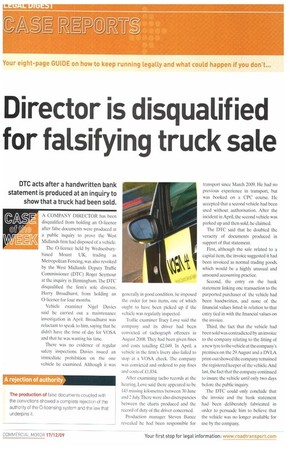Director is disqualified for falsifying truck sale
Page 22

If you've noticed an error in this article please click here to report it so we can fix it.
DTC acts after a handwritten bank statement is produced at an inquiry to show that a truck had been sold.
A COMPANY DIRECTOR has been disqualified from holding an 0-licence after false documents were produced at a public inquiry to prove the West Midlands firm had disposed of a vehicle.
The 0-licence held by Wednesburybased Mount UK, trading as Metropolitan Fencing, was also revoked by the West Midlands Deputy Traffic Commissioner (DTC) Roger Seymour at the inquiry in Birmingham. The DTC disqualified the firm's sole director, Harry Broadhurst, from holding an 0-licence for four months.
Vehicle examiner Nigel Davies said he carried out a maintenance investigation in April. Broadhurst was reluctant to speak to him, saying that he didn't have the time of day for VOSA and that he was wasting his time.
There was no evidence of regular safety inspections. Davies issued an immediate prohibition on the one vehicle he examined. Although it was generally in good condition, he imposed the order for two items, one of which ought to have been picked up if the vehicle was regularly inspected.
Traffic examiner Trac3„, Love said the company and its driver had been convicted of tachograph offences in August 2008. They had been given fines and costs totalling £2,049. In April, a vehicle in the firm's livery also failed to stop at a VOSA check. The company was convicted and ordered to pay fines and costs of £1,834.
After examining tacho records at the hearing, Love said there appeared to be 143 missing kilometres between 30 June and 2 July. There were also discrepancies between the charts produced and the record of duty of the driver concerned.
Production manager Steven Bunce revealed he had been responsible for transport since March 2009. He had no previous experience in transport, but was booked on a CPC course. He accepted that a second vehicle had been used without authorisation. After the incident in April, the second vehicle was parked up and then sold, he claimed.
The DTC said that he doubted the veracity of documents produced in support of that statement.
First, although the sale related to a capital item, the invoice suggested it had been invoiced as normal trading goods, which would be a highly unusual and unsound accounting practice.
Second, the entry on the bank statement linking one transaction to the purported purchaser of the vehicle had been handwritten, and none of the financial values listed in relation to that entry tied in with the financial values on the invoice.
Third, the fact that the vehicle had been sold was contradicted by an invoice to the company relating to the fitting of a new tyre to the vehicle at the company's premises on the 29 August and a DVLA print-out showed the company remained the registered keeper of the vehicle. And last, the fact that the company continued to insure the vehicle until only two days before the public inquiry.
'Me DTC could only conclude that the invoice and the bank statement had been deliberately fabricated in order to persuade him to believe that the vehicle was no longer available for use by the company.
























































































































































